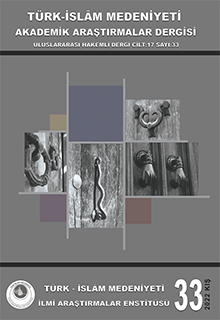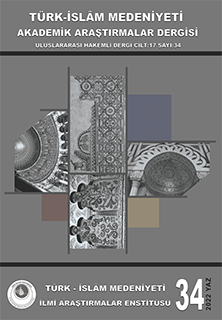In Terms of Lexicology to Approach Classical Commentary in Ottoman Era
DOI:
https://doi.org/10.5281/zenodo.6526509Keywords:
Turkish language, lexicology, explanation, Ottoman eraAbstract
In the Turkish literature, the explanation of custom and Turkish commentary texts of the Ottoman era have a significant place. An important part of these texts written in different disciplines and for different purposes are the classical commentaries prepared by the language and literature approach. Although the texts of this annotation are partial dictionary, they are the immediate source in terms of determining the formation of words, their historical course, the meanings that have been changed or forgotten, and the subtleties of meaning. From this point of view, it is possible to say that the annotated texts are works that can contribute to the studies of lexicography. Particularly, the commentary of the classical works belonging to the common Islamic culture and civilization basin reveal the vocabulary of this area and take the role of transferring the international culture. In this study, firstly it has been given information about the texts of Turkish commentary that based on language and literature in Ottoman era. And then it can be seen from the in terms of lexicology to contemporary dictionary studies in the necessity of making more use of these texts and re-meaninging the words of the Turkish poetry vocabulary of Ottoman era by using the texts of Arabic and Persian two commentary texts.
References
Ceylan, Ö. (2000). Tasavvufî Şiir Şerhleri. İstanbul: Kitabevi Yayınları.
Durmuş, E. (2018). Mehmed Şakir Efendi, Hediyyetü’l-İrfân Der-Şerh-i Bahâristân (İnceleme-Metin). İstanbul Medeniyet Üniversitesi SBE. Yayımlanmamış Doktora Tezi. İstanbul.
Durmuş, E. (2014). Şerh-i Kelimât-ı Çehâr Yâr-ı Güzîn. Sakarya Üniversitesi SBE. Yayımlanmamış YLT. Sakarya.
Eker, Ü. (2015). Lehçe İçi Aktarma Yöntemleri. İstanbul: Kesit Yayınları.
Gutas, D. (2011). Yunanca Düşünce Arapça Kültür. İstanbul: Kitap Yayınevi.
Güleç, İ. (2019) Konusu Mensur Metin Olan Doktora Tezleri Üzerine Bir Değerlendirme. Divan Edebiyatı Araştırmaları Dergisi. 22, 307-330. Mustafa b. Mehmed Kastamonî (Hâcegîzâde Mustafa Efendi). Terceme-i Sad Kelîmet-ı Çaharyar-ı Güzin (Şerh-i Kelimât-ı Çehâr Yâr-ı Güzîn). İstanbul: Süleymaniye Kütüphanesi. A. Tekelioğlu, 07 Tekeli 425.
Mehmed Şâkir Efendi. (1836). Hediyyetü’l-İrfân Der-Şerh-i Bahâristân. İstanbul: Dârü’t-Tıbâati’l-Âmire.
Nur Doğan, M. (1995). Metin Şerhi Üzerine. Yedi İklim. 9.63, 70-74.
Yazar, S. (2011). Anadolu Sahası Klasik Türk Edebiyatında Tercüme ve Şerh Geleneği. İstanbul Üniversitesi SBE. Yayımlanmamış DT. İstanbul.
Yılmaz, O. (2007). Klasik Şerh Edebiyatı Literatürü. Türkiye Araştırmaları Literatür Dergisi. 5.9, 271-304.
Yılmaz, O. (2018). Şerhin Metninden Metnin Şerhine: Türkçe Şerhlerden Hareketle Klasik Türk Şiirinin Anlam Dünyasına Katkılar I. HikmetAkademik Edebiyat Dergisi. Prof. Dr. Ali Nihad Tarlan Özel Sayısı. 4, 264-273.
Downloads
Published
How to Cite
Issue
Section
License

This work is licensed under a Creative Commons Attribution-NonCommercial 4.0 International License.







